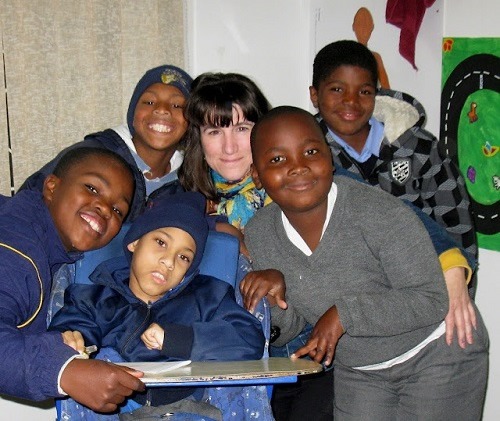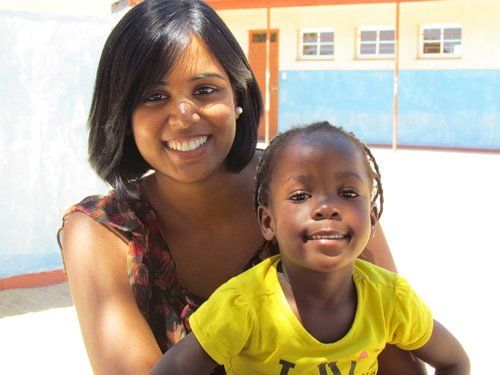Top Volunteer Sending Organizations for Africa
Tips from an Expert to Help You Select the Best Program for You
By Zahara Heckscher
Resources updated 11/10/2023 by Transitions Abroad

|
|
WorldTeach teacher with students
in South Africa. Photo courtesy of Worldteach.
|
Volunteering in the diverse continent of Africa can be more physically, emotionally, and financially challenging than volunteering in other parts of the world. But most people who have volunteered there will tell you it was well worth the effort.
The Unknown Diversity of the African Continent
The outdated image of volunteering in Africa — living in a hut in an isolated rural village — is only a reality for a tiny number of volunteers. You might be working in an office in a big city, teaching in a rural
school, or working with AIDS orphans in a drama program for street children.
Volunteering in Africa carries with it the baggage of unrealistic expectations — fueled by paternalistic images such as Norman
Rockwell’s painting of a Peace Corps volunteer teaching a group of African farmers how to use a plow. I can almost guarantee you that you won’t be teaching an African farmer how to plow. You won’t single handedly save a
village from starvation. But you may have a chance to learn from and celebrate life with the most resilient, interesting, and determined people you have ever met. If you are humble about your expectations, you may make a small difference in
someone’s life and a big difference in your own.

|
|
WorldTeach teacher with student
in Namibia. Photo courtesy of Worldteach.
|
Another unrealistic expectation is that “roughing it” as a volunteer in Africa will be unilaterally difficult. You might find, as I did, that you love walking to the river for a bucket of water for your daily
cold shower. On the other hand, you might find that you are not really roughing it—many long-term volunteers are surprised to find out that there is the expectation in some communities that they will hire a cook and housekeeper. But for
most volunteers, especially if you are in a rural placement, expect to forgo some of your creature comforts and know that private time may be minimal. Maybe you will find joy in a simpler pleasures and a more communal approach to life.
When planning a volunteer experience in Africa, here are a few things to consider:
Language: There are many countries in Africa where most of the population speaks at least enough English to communicate. If you are on a short-term program you might want to limit your search to one of these
countries (or a country where you are fluent in the national language) so you can have meaningful exchanges with local people. If you are volunteering for a longer time frame, you might want to start with language training.
Regional differences: North Africa is historically and culturally very different from Sub-Saharan Africa. There are 53 countries in Africa if you include the Island nations, ranging from Muslim, Arab and
Berber Morocco to the not-quite-yet-melting pot of Europeans, Africans, and Asians in South Africa. Even countries with a similar geography and history, such as Kenya and Tanzania, maintain radically different cultures, with parts of Kenya as
busy as New York City and most of Tanzania known for more laid back culture. And within countries, you’ll find vast regional differences — a Massai community near Lake Naivasha will be totally different from an urban slum in Nairobi.
Urban vs rural: For my money, I’d prefer rural Africa almost any time. In rural Africa, you will generally find a low crime rate, a slower pace of life, more intact cultural traditions, a cleaner environment,
the chance to learn from wise old farmers or herders, and frequent views of the big African sky. But I recognize the charms of the city too, where you may experience more interesting nightlife, a wider range of musical styles and cultural variety.
Your health. Malaria, HIV, and other infectious diseases are prevalent in many parts of Africa. Don’t even think of volunteering without a visit beforehand to the local clinic for travelers. Avoid unsafe
casual sexual relations. Take special care at beaches without lifeguards and in most places drink only boiled or bottled water. Make sure you know a reputable place to get treatment if you get sick, and also invest in good evacuation insurance
if not provided by the volunteer program — or if you set up an independent volunteer experience.
For More Information on Selected Programs in Africa
No volunteer program is a perfect match for everyone. Before you chose, think about your own preferences, budget, timeline, and skills. Here are a few of my favorites, based on six years of research for my book, How
to Live Your Dream of Volunteering Overseas
African Impact offers a very wide variety of responsible volunteering projects throughout continent, including countries such as Kenya, Malawi, Mozambique, Namibia, South Africa, Zambia, Zanzibar, and Zimbabwe. The projects are very varied, from wildlife conservation to animal care to teaching and education to community development to photography. The organization strives to maintain a positive impact through every project.
Global
Volunteers is
one of the longest and most reputable volunteer sending
organizations. Typical volunteers are in their 50s or
older, but younger volunteers and those with families
may find a good match as well. Global Volunteers specializes
in short-term programs of 1-3 weeks in Tanzania.
AHEAD is excellent if you seek a medium-term volunteer experience, are interested in Tanzania, and want more of a grassroots experience than other programs offer, consider AHEAD, Inc.
Learn about other options for organizations and programs for volunteering
in Africa.
|
Adapted from How to Live Your Dream of Volunteering Overseas.
ZAHARA HECKSCHER is the co-author of the book How to Live Your Dream of Volunteering Overseas, which includes evaluations of over 80 volunteer programs and suggestions for preparing to volunteer.
|
